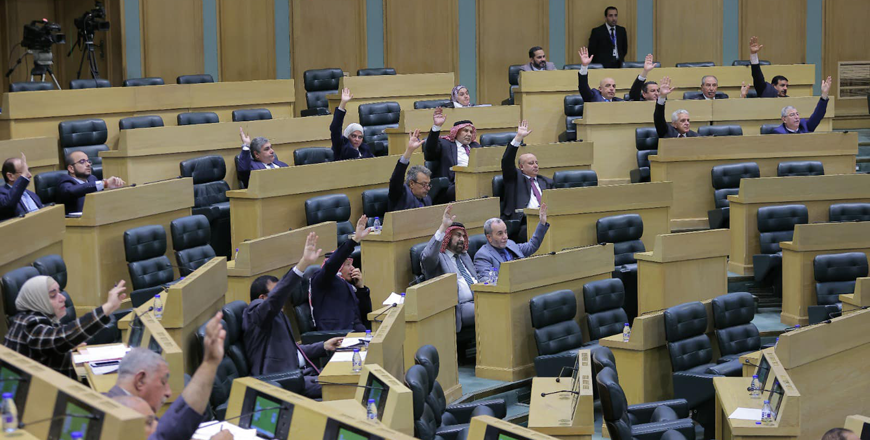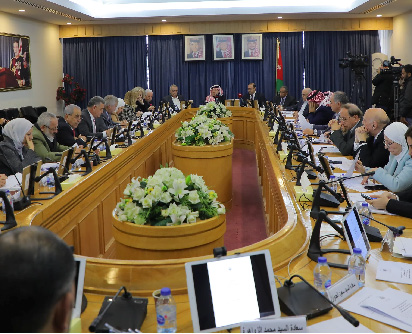You are here
Journalists, activists express dismay over MPs’ endorsement of Right to Access Information Law
By Rana Husseini - Jan 22,2024 - Last updated at Jan 22,2024

Lawmakers attend Lower House session on Monday, during which they pass the right to Access Information Law (Photo Courtesy of Petra)
AMMAN — Journalists and activists on Monday expressed their dismay and frustration over the passing of the draft amendments for the Right to Access Information Law by the Lower House of Parliament earlier in the day.
Jordan Press Association (JPA) member Khaled Qudah told The Jordan Times that the “deputies passed the same draft law that was suggested by the government in 2019”.
“During the period between 2019 and today, two draft laws related to press freedoms and flow of information were passed by the Parliament,” Qudah said, referring to the Cyber Crime Law and the Data Protection Law.
The two laws, Qudah added, worked to “impose stiff punishments on journalists and imposed restrictions on the flow of information, which should be our right and not a [privilege] given by the government”.
“We were hoping that the government would have withdrawn the law that was passed today [Monday] instead of approving it by the MPs because this law works as a hindrance to our work,” Qudah said.
He also referred to one of the amendments that reduced the waiting period given to institutions for disclosing information by the press after the requested date to 15 days instead of 30.
“Time is of prime significance and this clause will prevent us from professionally doing our job,” Qudah stressed.
JPA Vice President Jamal Shteiwi agreed with Qudah saying this condition imposed on journalists will work as a “hindrance to our work and will prevent the public from learning important information at the right time”.
“The world is moving forward by easing the flow of information and our government is adopting the old and bureaucratic methods in dealing with the freedom of press and information,” Qudah said.
Both Qudah and Shteiwi agreed that imposing a 15-day condition to provide information to journalists might work against the government because “this long period might result in spreading rumours and false information that would work against the government and the country as a whole”.
Both Shteiwi and Qudah said they were hopeful that the Upper House of Parliament “will listen to our comments and concerns and reflect it in their discussions in the coming weeks”.
Meanwhile, civil activists expressed similar concerns related to “imposing laws that restrict the flow of information from the public.
One of the amendments in the draft law obliges civil societies and any entity that receives foreign funding to provide information to the press within 15 days. The old law stipulated 30 days.
“Although she objected to any clause that imposed flow of information, she finds this article counterproductive,” Director of Tamkeen organisation Linda Kalash told The Jordan Times .
“I do not see any reason why this article was included because we cooperate with the press in a fast and easy manner since we consider them [journalists] as one of our main partners,” Kalash said.
Kalash added that her orgainsation has constantly provided the necessary required information by the press as long as “it did not violate the privacy and rights of the individuals that we help”.
Arab Women Organisation Progarmmes Director Laila Naffa also described access to information as a “right” for everyone without imposing any conditions or rules.
“We constantly reject any articles in the law that impose restrictions to access to information since we strongly believe that anyone, especially journalists, should have the right to access information in a manner that would help conduct their job most professionally,” Naffa told The Jordan Times.
One of the draft law’s provisions includes granting membership in the Information Council to leaders of journalists’ and lawyers’ syndicates and representatives from civil society, but it does stipulate the right of any Jordanian and non-Jordanians residing in the country to access information.
Another provision stipulates that departments shall periodically publish information concerning their organisational structure and functions, their operating mechanism and related legislation.
Another provision of the draft law emphasises that officials shall refrain from disclosing information acquired from another country under mutual confidentiality agreements. It also prohibits the disclosure of information that may harm national defence, state security or foreign policy.
The article also bans the disclosure of information containing analyses, recommendations, suggestions or consultations before a decision is taken, personal information, educational or medical records, job records, accounts, bank transfers or professional secrets.
The MPs also passed a provision in the law ensuring the right of any Jordanian and non-Jordanians residing in the country to access information.
They also endorsed a provision granting journalists’ and lawyers’ syndicates and civil society organisations a membership in the “Information Council”, which will be established under the law.
According to the validating reasons of the law, the new amendments are in line with international agreements and best practices on access to information laws and aim enhance transparency, integrity, and anti-corruption measures, while promoting a culture of the right to know and access to information.
In August and during a meeting with the National Centre for Human Rights and JPA board members, His Majesty King Abdullah stressed the importance of developing the draft law that guarantees the right to access information “since it is a constitutional right that must be guaranteed”.
The King reaffirmed Jordan’s commitment to political and media pluralism, adding that the Kingdom was never an oppressive country and will never be one, and its history is a testament to that.
His Majesty directed the government at the time to review the draft law guaranteeing access to information to ensure everyone’s right of timely access to correct and accurate information, which contributes to countering rumours and false news.
Related Articles
AMMAN — The Lower House on Sunday began its review of the 2019 amendments to the Access to Information Law, which the Cabinet approved on De
AMMAN — The Lower House on Wednesday continued discussing the draft amendments related to the Law of the Right to Access Information, passin
AMMAN — The Senate’s Legal and Media and National Guidance committees on Monday passed the draft Right to Access Information Law as referred













